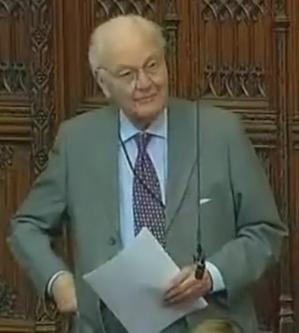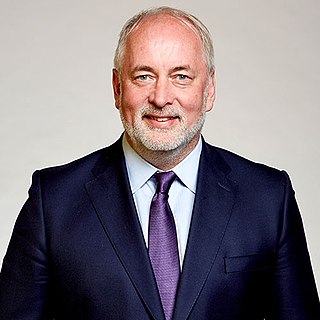Related Research Articles

Sir Michael Victor Berry,, is a mathematical physicist at the University of Bristol, England.
Bryan Campbell Clarke was a British Professor of genetics, latterly emeritus at the University of Nottingham. Clarke is particularly noted for his work on apostatic selection and other forms of frequency-dependent selection, and work on polymorphism in snails, much of it done during the 1960s. Later, he studied molecular evolution. He made the case for natural selection as an important factor in the maintenance of molecular variation, and in driving evolutionary changes in molecules through time. In doing so, he questioned the over-riding importance of random genetic drift advocated by King, Jukes, and Kimura. With Professor James J Murray Jnr, he carried out an extensive series of studies on speciation in land snails of the genus Partula inhabiting the volcanic islands of the Eastern Pacific. These studies helped illuminate the genetic changes that take place during the origin of species.

Jack Lewis, Baron Lewis of Newnham, FRS, HonFRSC was an English chemist working mainly in the area of inorganic chemistry.

Margaret Ann Boden is a Research Professor of Cognitive Science in the Department of Informatics at the University of Sussex, where her work embraces the fields of artificial intelligence, psychology, philosophy, and cognitive and computer science.

Sir Bernard Walter Silverman, is a British statistician and former Anglican clergyman. He was Master of St Peter's College, Oxford, from 1 October 2003 to 31 December 2009. He is a member of the Statistics Department at Oxford University, and has also been attached to the Wellcome Trust Centre for Human Genetics, the Smith School of Enterprise and the Environment, and the Oxford-Man Institute of Quantitative Finance. He has been a member of the Council of Oxford University and of the Council of the Royal Society. He was briefly president of the Royal Statistical Society in January 2010, a position from which he stood down upon announcement of his appointment as Chief Scientific Advisor to the Home Office. He was awarded a Knighthood in the 2018 New Years Honours List, "For public service and services to Science".
Sir David Keith Peters is a retired Welsh physician and academic. He was Regius Professor of Physic at the University of Cambridge from 1987 to 2005, where he was also head of the School of Clinical Medicine.
Johanna Doris Moore FRSE is a computational linguist and cognitive scientist. Her research publications include contributions to natural language generation, spoken dialogue systems, computational models of discourse, intelligent tutoring and training systems, human-computer interaction, user modeling, and knowledge representation.

Sir Liam Joseph Donaldson is a British doctor. He was formerly the Chief Medical Officer for England, being the 15th occupant of the post since it was established in 1855. As such, he was principal advisor to the United Kingdom Government on health matters and one of the most senior officials in the National Health Service (NHS).

Sir Nigel Richard Shadbolt is Principal of Jesus College, Oxford, and Professorial Research Fellow in the Department of Computer Science, University of Oxford. He is Chairman of the Open Data Institute which he co-founded with Tim Berners-Lee. He is also a Visiting Professor in the School of Electronics and Computer Science at the University of Southampton. Shadbolt is an interdisciplinary researcher, policy expert and commentator. His research focuses on understanding how intelligent behaviour is embodied and emerges in humans, machines and, most recently, on the Web, and has made contributions to the fields of Psychology, Cognitive science, Computational neuroscience, Artificial Intelligence (AI), Computer science and the emerging field of Web science.

Michael Lawrence KleinNAS is Laura H. Carnell Professor of Science and Director of the Institute for Computational Molecular Science in the College of Science and Technology at Temple University in Philadelphia, USA. He was previously the Hepburn Professor of Physical Science in the Center for Molecular Modeling at the University of Pennsylvania. Currently, he serves as the Dean of the College of Science and Technology and has since 2013.

The University of Nottingham is a public research university in Nottingham, United Kingdom. It was founded as University College Nottingham in 1881, and was granted a royal charter in 1948. The University of Nottingham belongs to the research intensive Russell Group association.

Michael Batty is a British urban planner, geographer and spatial data scientist, and Bartlett Professor of Planning in The Bartlett at University College London. He has been Director—now Chairman—of the Centre for Advanced Spatial Analysis, set up when he was appointed to UCL in 1995. His research and the work of CASA is focused on computer models of city systems. He was awarded the William Alonso Prize of the Regional Science Association in 2011 for his book Cities and Complexity, the same prize a second time for his book The New Science of Cities in 2017–2018, the University Consortium GIS Research Award in 2012, and the Lauréat Prix International de Géographie Vautrin Lud, the so-called 'Nobel for geography', in 2013. In 2015, he was awarded the Founder's Medal of the Royal Geographical Society and in 2016, the Gold Medal of the Royal Town Planning Institute (RTPI). He also received the Senior Scholar Award of the Complex Systems Society in September 2016.
Sheelagh Carpendale is a Canadian artist and computer scientist working in the field of information visualization and human-computer interaction.
Martin Schröder in an inorganic chemist. He is Vice President and Dean for the Faculty of Science and Engineering and Professor of Chemistry in the Department of Chemistry at the University of Manchester since June 2015. He served previously as Executive Dean of the Faculty of Science from 2011 to 2015 and Professor of Inorganic Chemistry at the University of Nottingham from 1995 to 2015.
David Andrew Whiten, known as Andrew Whiten is a British zoologist and psychologist, Professor of Evolutionary and Developmental Psychology, and Professor Wardlaw Emeritus at University of St Andrews in Scotland. He is known for his research in social cognition, specifically on social learning, tradition and the evolution of culture, social Machiavellian intelligence, autism and imitation, as well as the behavioral ecology of sociality. In 1996, Whiten and his colleagues invented an artificial fruit that allowed to study learning in apes and humans.

Nicholas Robert Jennings is a British computer scientist and the current Vice-Chancellor and President of Loughborough University. He was previously the Vice-Provost for Research and Enterprise at Imperial College London, the UK's first Regius Professor of Computer Science, and the inaugural Chief Scientific Adviser to the UK Government on National Security. His research covers the areas of AI, autonomous systems, agent-based computing and cybersecurity. He is involved in a number of startups including Aerogility, Contact Engine, Crossword Cyber Security, and Reliance Cyber Science. He is also an adviser to Darktrace, a member of the UK Government's AI Council, chair of the National Engineering Policy Centre and a council member for the Engineering and Physical Sciences Research Council.

Sir Peter William Mathieson is an English nephrologist and current principal and vice-chancellor of the University of Edinburgh. Previously, he served as the vice-chancellor and president of the University of Hong Kong (HKU). He was the dean of the Faculty of Medicine and Dentistry of the University of Bristol before he assumed office at the HKU in April 2014, and was previously director of studies at Christ's College, Cambridge.

The UCL Division of Psychology and Language Sciences is a Division within the Faculty of Brain Sciences of University College London (UCL) and is located in London, United Kingdom. The Division offers teaching and training and undertakes research in psychology and communication and allied clinical and basic science. It is the largest university psychology department in England.
Renee Elizabeth Sockett is a professor and microbiologist in the School of Life Sciences at the University of Nottingham. She is a world-leading expert on Bdellovibrio bacteriovorus, a species of predatory bacteria.

Elena Besley is a British scientist who is Professor of Theoretical and Computational Chemistry at the University of Nottingham. She holds a Royal Society Wolfson Fellowship and is Associate Editor of Nano Letters.
References
- ↑ "Professor Mike Fraser - Our People".
- ↑ "New Heads of Department Announced".
- ↑ "Mike C Fraser - Research outputs - University of Bristol". Research-information.bristol.ac.uk. Retrieved 30 October 2013.
- ↑ "The Future of Personal Computers | DShed". Watershed.co.uk. 3 June 2010. Retrieved 30 October 2013.
- ↑ "Short biography for Mike Fraser". www.cs.bris.ac.uk. Archived from the original on 12 December 2004.
- ↑ "Mike Fraser awarded Fellowship of the Royal Society of Arts". Archived from the original on 31 October 2013.